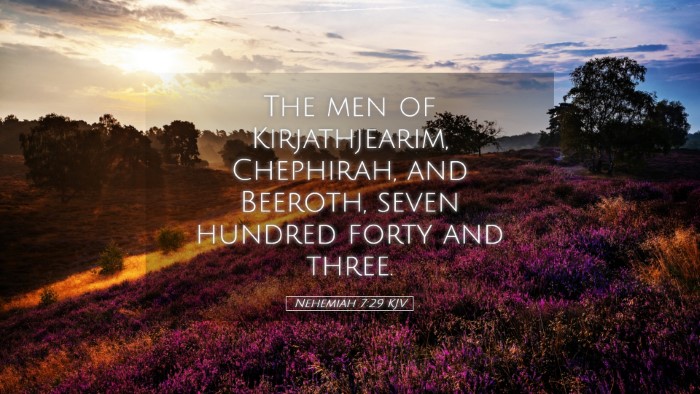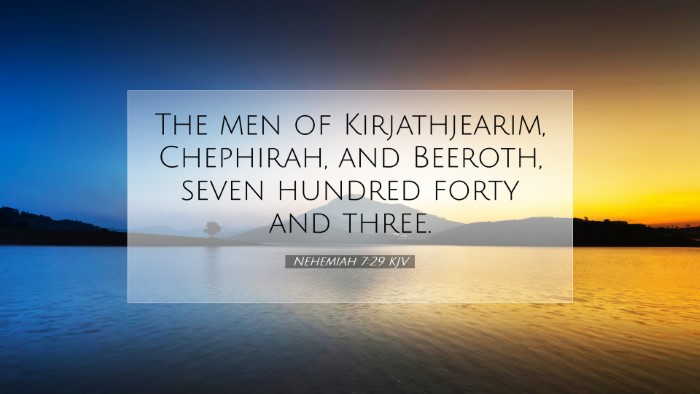Commentary on Nehemiah 7:29
Verse Reference: Nehemiah 7:29 - "The men of the other towns of Judah were: Benaiah son of Jehoiada; the sons of Benaiah; they were the descendants of the 1st son of Benaiah." (paraphrased for clarity)
Introduction
This verse from Nehemiah not only gives a glimpse into the genealogies that are crucial for understanding the re-establishment of the Jewish community post-exile, but it also emphasizes the importance of identity, heritage, and community in the rebuilding efforts of Jerusalem.
Commentary Insights
1. The Importance of Genealogy
Albert Barnes highlights the significance of genealogies as a means of confirming one's significance within the community. The inclusion of specific names serves to establish a sense of belonging and to restore the community's identity.
- This practice aligns with the ancient Near Eastern cultures where lineage served as a foundation for social and spiritual status.
- It reiterates God’s faithfulness in preserving a remnant through whom He could fulfill His promises, as seen throughout biblical history.
2. The Role of Leadership
Matthew Henry points out that Benaiah, mentioned in the verse, is not merely a name but represents a household of leadership and capability. His lineage speaks volumes about the quality and responsibility expected of leaders in their communities.
- The passage demonstrates that leadership in a community, particularly during restorative phases, is influenced by both divine appointment and human lineage.
- It invites emphasis on the preparation of leaders who carry the weight of their ancestry while being actively engaged in the restoration process.
3. Identity and Community
Adam Clarke comments on the communal aspect of this verse by underscoring how the listing of names and their families reinforces the unity and collective identity of the Jewish people.
- This collective identity becomes crucial as the Jews sought to re-establish their identity after the Babylonian exile, where many had lost their heritage.
- Thus, restoring the city was not only about physical walls but also about re-establishing social and spiritual ties among the people.
4. Theological Implications
Furthermore, this verse reminds modern readers of the theological significance of God’s covenant with Israel. As Henry notes, the genealogies reflect God’s unwavering plan to restore His people, which serves as a precursor to understanding the lineage of Christ.
- The emphasis on genealogy leads believers to the recognition of Jesus Christ as the ultimate fulfillment of God’s covenant throughout the Scriptures.
- This connection urges contemporary readers to reflect on their own individual and collective identities in Christ.
5. Conclusion: Practice of Remembrance
Bible scholars and pastors can glean from Nehemiah 7:29 not only a historical reconstruction but also a spiritual framework for community building. It is a call to remember, recognize, and celebrate the heritage that has shaped the current faith community.
- Each name serves as a reminder of the faithful who have gone before and the influence of their legacy on present believers.
- Thus, Nehemiah not only rebuilds the city but also invites subsequent generations to understand their identities, responsibilities, and the overarching narrative of redemption.
Final Thoughts
The exegesis of Nehemiah 7:29 reveals profound insights into the interplay of history, community, and faith. As these names echo through time, they remind us of God's faithfulness in preserving a people for Himself, and they provide a rich tapestry upon which future believers can reflect their own stories of grace, redemption, and identity.


